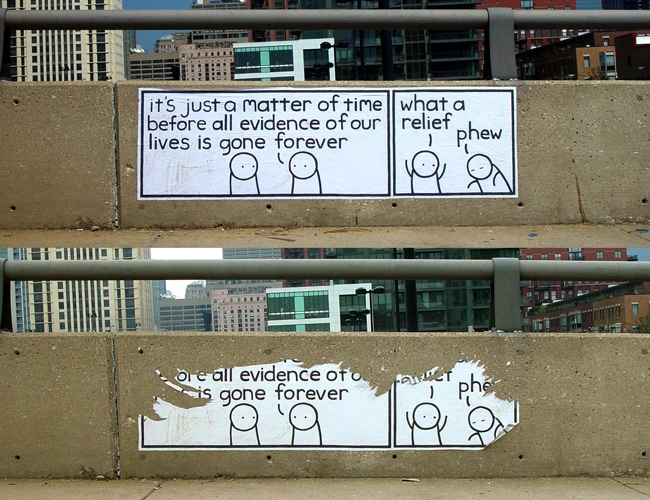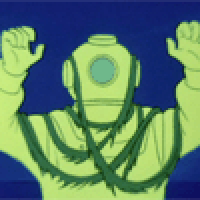I’ve been struggling with something for a while now and ironically a sitcom from the 80’s finally helped me pinpoint the problem. My TV was on for background noise and I noticed that it was an episode of Family Ties. In the episode, Elyse Keaton was having a problem. A prominent building that she designed was being torn down and replaced by a cookie cutter mini-mall. She was struggling with her “legacy” - her mark on the world - disappearing. After the building was gone, what evidence would there be that Elyse Keaton was there?
I’m facing a similar issue. I don’t like getting into my day job too much online (for various reasons), but suffice it to say that applications that I developed for decades are being sunset/replaced. I’ve developed quite a lot over the decades, but eventually it would all be replaced. Once it is, what will I have as “proof that TechyDad was here”?
How do you handle the existential crisis of our works being digital and transient versus having an actual, physical product?
I revel in the knowledge that entropy will erase us all.
I met a traveller from an antique land
Who said: Two vast and trunkless legs of stone
Stand in the desart. Near them, on the sand,
Half sunk, a shattered visage lies, whose frown,
And wrinkled lip, and sneer of cold command,
Tell that its sculptor well those passions read
Which yet survive, stamped on these lifeless things,
The hand that mocked them and the heart that fed:
And on the pedestal these words appear:
“My name is Ozymandias, king of kings:
Look on my works, ye Mighty, and despair!”
Nothing beside remains. Round the decay
Of that colossal wreck, boundless and bare
The lone and level sands stretch far away.-- Percy Shelley, “Ozymandias”, 1819 edition
(copied from Wikipedia)Pile the bodies high at Austerlitz and Waterloo.
Shovel them under and let me work—
I am the grass; I cover all.And pile them high at Gettysburg
And pile them high at Ypres and Verdun. Shovel them under and let me work.
Two years, ten years, and passengers ask the conductor:
What place is this?
Where are we now?I am the grass. Let me work.
Oh, there’s definitely upsides to that. There are posts I made to Usenet in my college years that I’m glad have been swallowed up by time and consigned to oblivion. I would hate it if all of those embarrassing moments were to suddenly resurface and become a permanent part of my present and future life.
But the idea that EVERYTHING that I’ve done will vanish freaks me out. Yeah, this is definitely a midlife crisis coming on.

I relativise: one human among billions, on a planet among 9, surrounding a star among billions, in a galaxy among trillions. Things existed before I was born, things will exist after I die and they will continue to exist for a nigh uncountable amount of time. We are infinitesimally important and life has the importance you attribute to it.
What’s most important to me is gaining more understanding and knowledge in the most comfortable manner possible, while trying to be a positive influence during my blip in universal time. A legacy is thus completely and utterly unnecessary.
Beautifully put
I’m with you on this mindset. I think to survive death and persist is an innate survival instict that only mindfulness and intelligence can overcome.
Everything we build is on the shoulders of what came before. Your contribution now creates a world that makes other people’s work possible in the future. While the literal artifacts you produce will not be there for long, for the time they existed they provide a small piece of the platform upon which the next generation will be created. Like sand eventually forming rock.
How do you handle the existential crisis of our works being digital and transient versus having an actual, physical product?
Well this topic is very subjective, but I’ll chime in…
Basically: You should be programming because you like programming - Not because you like that people like your program, or that it might immortalize yourself somehow - Or because people might use your program forever and will remember you by it
You can say the same for every profession: You’re the best doctor in the world and you healed millions of people. Great. 100 years later all those people are still dead anyways. What was the point?
Basically everything is temporary in the end, and everything is going to be forgotten. Seeing your job as a programmer as part of your identity and your applications as proof of your existence or digital legacy is pretty much pointless
Yeah, I think a big part of this might be a kind of mid life crisis. I’m not the “buy an expensive sports car” kind of guy, but I’m definitely the “worry that all you’ve done in your life was for nothing” sort of guy.
My wife crochets and I’ve got to admit to being jealous that she has a physical object when she’s done. I love programming. I love being able to take a big and complex problem, break it down, and construct an application that solves the issue. Still, at the end of the day, our works are 1’s and 0’s whose existence will be a lot shorter than my wife’s crocheted house elf.
My wife crochets and I’ve got to admit to being jealous that she has a physical object when she’s done.
It sounds like you don’t really have an outlet to create artsy or physical stuff, but as a programmer there’s plenty of stuff you can do…
For example, I’ve turned my entire house into a “Smart Home” - My house has smart lights that can be turned on be wifi, and my doors and rooms have motion censors that I’ve all programmed to work together, and turn things on an off when I’m walking around. You’re programming a bunch of physical IoT things to work together, and the end-result when everything runs smoothly is pretty cool
Also I recently got a 3d printer (where maintaining that is a hobby in of itself) - as a programmer you can create a lot of cool stuff with that. Like there are scripts to play with to generate a Sierpiński triangle[1][2] - work on that, physically print that, and see the results as a physical object.
As a programmer you have plenty of skills to start creating random physical stuff. Even if it’s not for your work, just pick it up as a hobby. Like I don’t think your wife is a professional crochetter - so what’s stopping you from crochetter or painting or sculpting or whatever
I do enjoy building LEGO. Not just the boxed sets, but I’ll get minifigures and then design and build biomes for them. After writing about my wife’s crochet, I realized that this is one reason why I enjoy this so much. I design a habitat for a LEGO minifigure using BrickLink Studio (a CAD program for LEGO)., I refine the build - both to improve it and to lower the cost of the build. Then, I order the parts and build it. (And then, I’ll often need to add additional parts to fix issues with the build that weren’t apparent until it was built.)
I’ll need to do some more of that building. Frankly, if I’m going to have a midlife crisis, it’s going to be a “build LEGO” midlife crisis and not a “buy a sports car” one.
Not specific to work but this is a topic I’m interested in. It’s not a great solution, but iCloud has a legacy contact feature, and I back up all my important stuff there for availability to my heirs should something happen unexpectedly. Almost my entire family is Mac (or at least iOS / iPhone) so this works for us.
Longer term I’d like something more comprehensive. For example I don’t have records or media to share in terms of music or reading habits to pass down…I’d be open to having my Spotify likes passed down for example.
Anyway, for apps I imagine a similar thing could work, if you had a local environment snapshot you could pass on. But it’s tough as in 30yrs for example you might not even have hardware that could run the software of today. My buddy does digital archival stuff and this is a big part of his work, preserving the associated systems beyond just the code.
This is not a direct answer, but I think you have the beginnings of a useful perspective in that episode of “Family Ties”. Namely, it is not a problem arising from the ephemeral nature of software, but the nature of time and change.
How did your contributions impact the world? I’m not talking about Wikipedia worthy projects or products. If you didn’t do what you did, how would the world be different? Let’s say you worked on data validation tools in tax software for the IRS. Maybe you prevented thousands of people from the stress and struggle of bogus audits. Or maybe you worked on compilers for a defunct architecture, and your optimizer saved billions of watt-hours of energy in wasted cycles over the years
I can look back at my career and point to moments where I’ve made a small dent in the history of the technologies I worked with, yet my name isn’t attached to any. I’ve also worked on personal projects that are mostly defunct but had thousands of users in their heyday, but because I used a handle for many of them (for reasons) the people who might remember what I did will never know my name when I’m gone.
I’m good with knowing I made some sort of difference without being personally remembered. But that’s just me, and I think it’s important to recognize the ways you want to be recognized.
With that said, name recognition on for-pay work is rare. You’re probably out of luck getting that recognition for your previous work, but there are things you can do now. If you have personal projects, post them on GitHub and advertise them on relevant forums. If you don’t, consider contributing to an OSS project. With Github’s Arctic vault program, your PRs to a major project may outlive humanity. If you don’t want to work on personal projects at all, consider finding a job where you can be paid to contribute to OSS, or ask your employer if you can spend 20% time giving back to libraries your company depends on.
My contributions definitely had an impact, but it was more local than global. Like I said in my post, I don’t like talking about my day job online, but over the years thousands of people have used the applications that I’ve written. I’ve had many people compliment me saying that the applications helped them out. (As a side note, I wish my Imposter Syndrome would remember those praises when it tries to tell me that I don’t know what I’m doing.)
I guess it’s just hard to see a lot of the things that you’ve worked so hard on over years being taken down one after another.
Everything you code is disposable. Get at peace with that fact and you will be happy. It was crappy code anyway.
I am not remembered for the technology I put in place, the tickets I close or the outages I help remediate.
But when I left a job I’d been at for 5 years, I found again that I am remembered for how I make people feel when I interact with them. Just by being myself, I’d been kind to a lot of people who really needed to hear kindness, and I helped a lot of people get started when they were struggling.
What I do in the digital realm will disappear decades before those people forget who I am.
Struggling a little with this too. The distance of time is my biggest grief: it’s hard to apply for jobs, when my most relative experience for various roles is 5-10 years old. And the further along in my career, the less there is to show, or people to speak up for what I accomplished. “Did I really do that, at all”… worst case of imposter syndrome I can think of.
I feel like I’m in a position to reply to this professionally. My product is top in class. Literally best in the world but will inevitably be reduced to nothing, comparatively and will eventually be recycled as typical tech eol.
But that doesn’t make your accomplishment any less valid my guy. Like you said probably thousands of people relied on you and your sw for a long time. That in Itself is your legacy. Tbh you can’t expect any more from that when youre In tech. Uk how fast it moves.
How do you handle the existential crisis of our works being digital and transient versus having an actual, physical product?
Honestly, I’ve already gone through this when I realized that a lot of the software I wrote in the 90s is gone forever. Luckily, textfiles archived some of it (both binaries and source), but I really wish I open sourced more of my personal projects back in the day.
That said, I think video games have a longer shelf life than any other software… people will always want to play old games. As long as that’s the case, at least my name will continue on in the ScummVM source.







